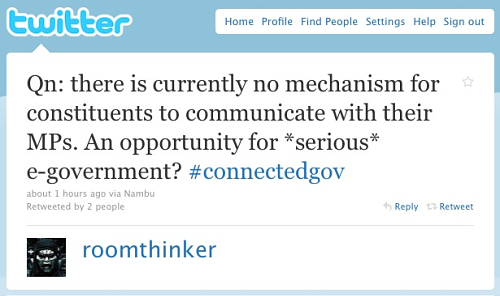In the twenty-third in our series of guest blog posts, Wayan Vota from Inveneo reflects on the potential of SMS - and FrontlineSMS - to hold local government to account in the developing world. Local governments in the developing world face a serious communications problem. As Roomthinker tweets, there is currently no easy mechanism for constituents to communicate with their elected officials - in urban or rural and underserved areas:
Mass media can quickly inform or educate but radio, TV, and newspapers are usually state controlled by national organizations distant from local needs or decisions. And none of these media are two-way communications. Just one-to-many broadcast mediums.
Share
In addition, local governments can be ignorant about constituents' changing needs and interests - especially marginalized communities that have been historically ignored or under-represented. Local governments may produce services that they find interesting or please national politicians without any feedback from the people they are expected to serve.
Yet there now exists a technology application that could give feedback on the needs of a community, even providing for targeted two-way communication between local governments and their citizenry. This technology is easy to implement and can be easily modified with changing needs: SMS text messaging.
SMS:Gov as 311
Local governments could set up automated SMS systems in their offices and then promote the phone number so citizens in need could text for local government assistance.
Using tools like FrontlineSMS, the local government would set us a simple menu tree for incoming text messages - each keyword would generate a particular response, leading to a new keyword. The system would track mobile phone numbers, allowing for a basic census of constituent needs and interests.
For example: someone texting "Weather" would receive a basic forecast & could respond with CropForecast, FishingForecast, or National Forecast for specialized weather forecasts in each area. This would both educate the respondents and track how many citizens were interested in each area.
Multiply this over the many local government services and a single FrontlineSMS instance could become an automated information service similar to the 311 service in New York, San Francisco, and Washington DC in the US, at a fraction of the cost.
SMS:Gov as Citizen Pulse
Smart politicians try to stay engaged with their electorate - keeping in constant communication with them to gauge their mood and needs. Yet how can a local politician know what his geographically dispersed constituents need and inform them of his efforts?
Again, using a FrontlineSMS system, officials can easily gather citizen input via SMS, grouping constituent interests by keywords. Then, based on those keywords, informing them of his actions in their interests. Think My Barack Obama, but via text message.
Try out live SMS:Gov
Intrigued? Then text "LOCALGOV" to this phone number +1.202.506.0148 and you can test out our live SMS:Gov demo. Yes, really! Try it yourself from anywhere in the world.
This post was originally published on the ICTworks blog from Inveneo in March 2010. Thanks to Wayan for kindly allowing us to republish.

